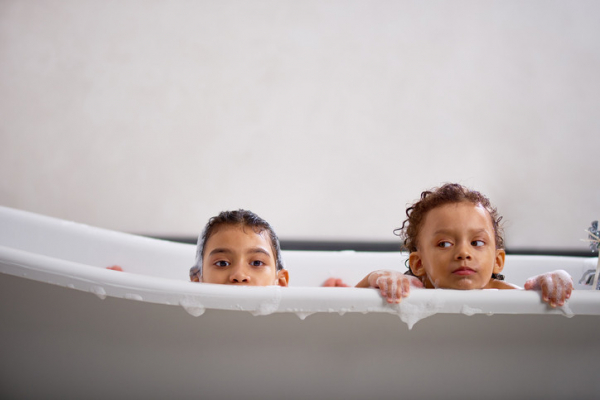
The daily bath or shower is a routine for many of us — and for our children, too. But is it really necessary?
The short answer is no.
Obviously, there are days when washing up makes good sense — like if your child is grimy from a day in the dirt; covered in sweat, paint, or other visible dirt; or had an explosive poop. It’s also a good idea to wash up if your child has spent the day in a pool (the chlorine may be irritating to the skin), a body of water (there could be things in the water that are irritating or unhealthy), or used bug spray to ward off ticks and mosquitoes. And certainly, it’s best for everyone in the vicinity when a stinky teenager takes a soapy shower.
Sometimes a doctor may recommend daily bathing for certain skin conditions. And we all need to wash our hands regularly to prevent infection. But full-body washing just for the sake of washing? Not so much.
Why not bathe a child daily?
Lots of bathing can lead to dry, irritated skin. But also, the skin has natural protective oils, and natural bacteria, that help to keep us healthy and safe — and that can get washed away with daily bathing.
If your baby or preteen looks pretty clean, isn’t stinky, isn’t covered in bug spray, and hasn’t been in a pool or other body of water, it’s fine to skip the bath or shower. Really, bathing two or three times a week is fine. In fact, for many kids, even just once or twice a week is fine. You can always do a quick wipe with a wet washcloth to the face, groin area, and any dirty spots.
Stinky teenagers might need more bathing or showering, depending on activity level and deodorant use. But even they may be able to get away with washing their face and using a soapy washcloth on their groin and underarms.
Tips for healthy bathing
When you do bathe children, here are some tips for healthy bathing.
- Don’t use hot water — use warm water instead.
- Keep it short — preferably just enough time to get the washing done.
- Avoid antibacterial soaps and bubble baths. Use mild, unscented soap and shampoo.
- Make sure bathing is supervised for all babies and young children.
- Pat dry rather than rubbing dry. If your child tends to have dry skin, using a mild, unscented greasy moisturizer after the bath can be helpful.
If your child has eczema or any other skin condition, check with your doctor to get tailored advice for bathing your child.
About the Author

Claire McCarthy, MD, Senior Faculty Editor, Harvard Health Publishing
Claire McCarthy, MD, is a primary care pediatrician at Boston Children’s Hospital, and an assistant professor of pediatrics at Harvard Medical School. In addition to being a senior faculty editor for Harvard Health Publishing, Dr. McCarthy … See Full Bio View all posts by Claire McCarthy, MD

Leave a Reply